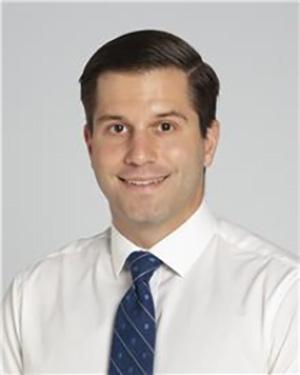Research News
02/12/2025
Time in the OR and the lab go hand-in-hand for neurosurgeon’s glioblastoma research
Dr. Matthew Grabowski received an American Cancer Society Clinician Scientist Development Grant to study a potential new treatment target for glioblastoma.

Dr. Grabowski in his lab.

Dr. Grabowski with his lab member and PhD student Swapnil Dey working in the lab.

Dr. Grabowski examines samples in a microscope.

Dr. Grabowski and Swapnil Dey in the lab.
Growing up, neurosurgeon and researcher Matthew Grabowski, MD, enjoyed working with his hands. He tinkered with cars and bikes his dad brought home — he liked being able to fix things that were broken and seeing the results immediately. Now, you can find him performing brain surgery in the morning and examining specimens in the lab in the afternoon as part of his day as a Cleveland Clinic physician-scientist.
“Biomedical engineering meshed my interest in medicine and biology with engineering, which goes back to what I’ve been drawn to my whole life – being able to see problems, come up with a plan and fix them,” Dr. Grabowski explains.
Dr. Grabowski recently received the American Cancer Society Clinician Scientist Development Grant, which supports clinicians on their path to become independent investigators as clinician scientists. The award recognizes Dr. Grabowski’s unique skillset as a successful neurosurgeon who hopes to establish a strong presence in the field of glioblastoma research. His lab has received $675,000 over 5 years to pursue their investigations into the protein lactotransferrin and its potential as a target to improve glioblastoma treatment options.
He shared his journey to becoming a physician-scientist and how his clinical experience affects his research role.
The path to glioblastoma research started on the ice
Dr. Grabowski’s interest in neuroscience started when he was playing high school hockey, witnessing concussions on the ice. He was already interested in science, but the real-world impact turned his interest towards the brain. It inspired him to conduct his high school senior year thesis project on concussions and traumatic brain injury under a neurosurgeon at University of Pittsburgh Medical Center (UPMC).
Dr. Grabowski went on to attend Case Western Reserve University for Biomedical Engineering and earned his medical degree with special qualification in biomedical research at Cleveland Clinic’s Lerner College of Medicine. He then matched into neurosurgery residency at Cleveland Clinic.
“We’re really fortunate with the residency training program here at Cleveland Clinic — we have two years built-in for dedicated research time to explore an area of interest related to neurosurgery,” Dr. Grabowski explains.
Dr. Grabowski worked in the lab of Justin Lathia, PhD, where he studied the relationship between malignant brain tumors and the immune system. Dr. Lathia also connected him with Peter Fecci, MD, PhD, a neurosurgeon scientist at Duke University School of Medicine, for a year-long research fellowship. There, he experienced the day-to-day responsibilities of a clinician scientist and how to manage a lab alongside his cases in the operating room.
Since finishing his residency in 2021, he has been a neurosurgeon in the Rose Ella Burkhardt Brain Tumor and Neuro-Oncology Center at Cleveland Clinic, where he regularly sees patients with brain tumors, performing operations and providing guidance with treatment next steps. He also now has his own lab space, right next to his mentor Dr. Lathia.
“We are lucky to have such a great partner in Dr. Grabowski,” Dr. Lathia says. “He continues to bring his clinical experience to the laboratory, which results in us asking deeper, more impactful questions that have the potential to change the trajectory of diseases such as glioblastoma. He has the uncanny ability to take observations he makes as a neurosurgeon and focus them on a key scientific question to investigate in the laboratory.”
Supporting patients past a scalpel or stitches
Little progress has been made with new treatments for glioblastoma over the past 30 years, which Dr. Grabowski explains is because of potent immune suppression in the brain’s microenvironment. Immunotherapies are way less effective for glioblastoma treatment than they are for other cancers.
The Grabowski lab discovered a subset of glioblastoma patients with increased levels of the protein lactotransferrin. Lactotransferrin is relatively unexplored in the brain and cancer but has shown anti-tumor effects. With the support of the ACS grant, the team plans to study lactotransferrin’s direct effect on tumor growth. They hypothesize that adjusting lactotransferrin levels in glioblastoma tumors may lead to a microenvironment that is more conducive to immunotherapies and improve outcomes in patients with glioblastoma.
Dr. Grabowski says he’s never been more certain that he’s working at the best place to make a difference — both at the bedside and the bench.
“I think it's really important to have a view into both the clinical and research sides. It’s easy to get siloed if you’re only focused on one aspect of the work,” Dr. Grabowski says. “I love that I interact with patients and help them navigate what is probably the scariest moment of their life. But I can also help them in the lab by advancing the research field — impacting more patients than you ever could with a scalpel or stitches.”
Featured Experts
News Category
Related News
Research areas
Want To Support Ground-Breaking Research at Cleveland Clinic?
Discover how you can help Cleveland Clinic save lives and continue to lead the transformation of healthcare.
Give to Cleveland Clinic